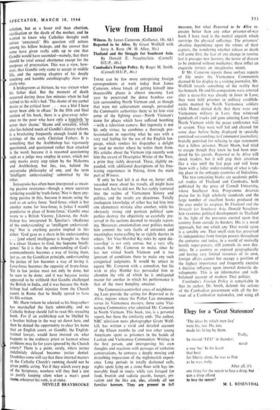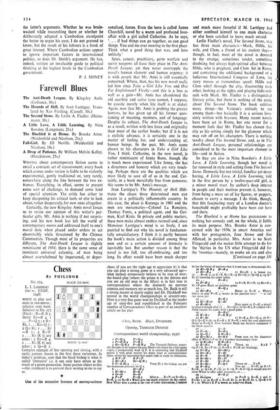View from Hanoi
THERE can be few more enterprising foreign correspondents at work today than James Cameron, whose knack of getting himself into inaccessible places is almost uncanny. Last year he penetrated the dense bamboo cur- tain surrounding North Vietnam and, as though that were not achievement enough, persuaded the Communist authorities there to let him visit some of the fighting areas—North Vietnam's name for places which have suffered bombing —with a television camera. But ingenuity is not his only virtue; he combines a thorough pro- fessionalism in reporting what he sees with a very real feeling for the use of the English lan- guage, which renders his dispatches a delight to read no matter where he writes them from. His articles about the Vietnam trip recently won him the award of Descriptive Writer of the Year, a prize they richly deserved. These, slightly ex- panded, with additional descriptions of his frus- trating experiences in Peking, form the main part of Witness.
If only he had left it at that or, better still, recorded more about his travels, all might have been well, but he did not. He has rashly ventured into the realms of Vietnamese history and politics, and the results are disastrous. Totally inadequate knowledge of either has led him into one elementary m;stake after another, while his obviously strong and partisan political sym- pathies destroy the objectivity so carefully pre- served in the sections devoted to straight report- ing. Moreover, emotionalism over politics makes him commit the very faults of extremist and meaningless name-calling he so rightly decries in others. 'Air Vice-Marshal Ky rules by open dic- tatorship' is not only untrue, but a very silly remark for Mr. Cameron to make, since he has not visited South Vietnam and is too ignorant of conditions there to make any such categorical judgments. It would be unjust to equate Mr. Cameron with a comedian, but his wish to play Hamlet has persuaded him to abandon the role of which he is undisputed master for another in which his performance is that of the most bungling amateur.
The Communist-controlled areas of neighbour- ing Laos provide the setting for Reported to be Alive, regions where the Pathet Lao movement serves its Vietnamese masters, those same Viet- namese Communists who admitted Mr. Cameron to North Vietnam. This book, too, is a personal report, but there the similarity ends. The author, NBC television news photographer Grant Wolf- kill, has written a vivid and detailed account of the fifteen months he and two other young Americans spent as prisoners in the hands of Laotian and Vietnamese Communists. Writing in the first person, and interspersing his own thoughts and reactions with passages of verbatim conversations, he conveys a deeply moving and 4:listurbing impression of the nightmarish experi- ence. Long periods in totally darkened cells, nights spent lying on a stone floor with legs im- movably fixed in stocks while rats foraged for food, brutish and sadistic guards, hunger, pri- vation and the like are, alas, already all too familiar horrors. They are present in full
measure, but what Reported to be Alive re- creates better than any other prisoner-of-war book I have read is the mental anguish which outstrips the physical sufferings. The prisoners' absolute dependence upon the whims of their captors, the wondering whether release or death will come first, the fear of any change in routine lest it presages new horrors, the terror of disease to be endured without medicines; these inflict an exquisite torture on imaginative minds.
If Mr. Cameron reports those surface aspects of life under the Vietnamese Communists deemed fit for displo to a visiting journalist, Mr. Wolfkill reveals something of the reality that lies beneath. He and his companions were arrested after a cease-fire was already in force in Laos; they were held prisoner in military establish- ments manned by North Vietnamese soldiers while Hanoi denied daily that there were any Vietnamese military in Laos; they witnessed hundreds of trucks and guns entering Laos from north Vietnam while the peace conference was in session. They were well fed and cleaned for some days before being displayed in specially contrived surroundings to Communist journalists; brutally punished for refusing to sign statements that a fellow prisoner, Major Moon, had tried to escape though they knew he had been mur- dered by his guards. Reported to be Alive will shock readers, but it will grip their attention like a vice until the last page and will leave them with a fuller understanding of what is tak- ing place in the unhappy countries of Indochina.
The two remaining books are academic politi- cal studies of Thailand and Cambodia, both published by the press of Cornell University, whose Southeast Asia Programme deserves praise for its high scholarly standards and the large number of excellent books produced on the area under its auspices. In Thailand and the Struggle for Southeast Asia, Donald Neuchter- lein examines political developments in Thailand in the light of the pressures exerted upon that country from outside its borders. His is a novel approach, but one which any Thai would agree is a sensible one. That small state has preserved its independence from foreign powers throughout the centuries and today, in a world of mutually hostile super-powers, still controls its own des- tinies. In a country so exposed geographically and having very limited resources of its own, foreign affairs cannot but occupy a position of the highest importance and frequently exercise a decisive influence upon internal domestic de- velopments. This is an informative and well- balanced account of modern Thai politics.
Cambodia's Foreign Policy is remarkable in that its author, Dr. Smith, defends the actions of the Cambodian government with all the fer- vour of a Cambodian nationalist, and using all
the latter's arguments. Whether he was brain- washed while researching there or whether he deliberately adopted a Cambodian standpoint the better to argue his case, I do not pretend to know, but the result of his labours is a book of great interest. Where Cambodian actions appear to ignore important factors in international politics, so does Dr. Smith's argument. He has, indeed, written an invaluable guide to political thinking at the highest levels in the Cambodian government.
P. J. HONEY



































 Previous page
Previous page